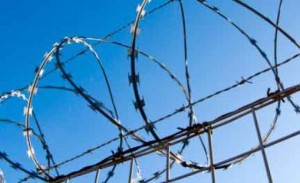
AFP PHOTO
The El-Nadeem Center for the Rehabilitation of Victims of Violence recently released a report on cases of torture and abuse in Egyptian prison and detention facilities during February.
The report, which documented at least 82 cases during the month, includes details of the ongoing torture of a group minors detained without charges in Deir Mowas police station Minya. It also includes accounts from across Egypt, such as the deaths of seven by police live ammunition in Beheira, as well as: general physical abuse; detention without charge; sexual abuse; and electrocution, all of which are inflicted on detainees of both sexes.
The Nadeem Center provides psychological, social and legal support without charge to victims of torture in Egypt. It reports that on average, their clients are two-thirds male and one-third female.
The report also includes testimonies from currently incarcerated inmates such as 29-year-old Hassan Ali Ahmed, imprisoned at Tora Prison since October 2012. He claims that officials, including Ahmed Ismail, head of intelligence at the prison, gave direct orders to inflict the illegal abuse: “They beat me, broke my left arm and sexually assaulted me causing an anal fissure.”
Ahmed reports he is held in a high security ward and has been tortured regularly, with one officer only stopping the abuse on payment of EGP 500 for every visit. After Ahmed ran out of money, however, the abuse resumed.
“They make me drink this mixture of water, oil, salt, washing powder, milk and tobacco. It makes us vomit a lot. Sometimes for two days,” Ahmed said. “Several inmates have died because of drinking this mixture.”
Ahmed maintains that prison authorities document cases of death through abuse as “circulatory failure”.
The centre’s February report also includes the notorious case of lawyer Kareem Hamdy who died in custody at Matariya police station in late February, after being arrested for allegedly participating in Muslim Brotherhood protests.
“His body was taken to the Matariya hospital and from there to the morgue where he was seen by his family,” the report said. “The family said they saw signs of torture on his face and hands and hence refused to sign the forensic report since the doctors refused to examine the body to document the signs of torture.”
Hamdy’s death sparked a wave of protest and outrage from the Egyptian Lawyer’s Syndicate who demonstrated against the ongoing abuse of power by security forces in Egypt.
Matariya police station’s reputation amongst residents of the deprived district of Cairo is so bad, that is commonly called a “slaughterhouse”. A report released by Amnesty International following the death of Hamdy said the “string of deaths” amongst detainees held in custody inside Matariya police station point to “torture and horrific detention conditions”.
At least nine detainees have died in Matariya police station since April 2014, three of which died last week alone. Amnesty International has described the investigations into their cases “half-hearted” since no one has been held accountable.
When previously asked for a response to the Amnesty International claims, a spokesperson from the Ministry of Interior’s media office told Daily News Egypt he “does not have enough information to respond”.
Following Hamdy’s death, the Ministry of Interior stated that “nobody is above the law”, and that whoever tortured Hamdi will soon be punished. However, activists criticise a lack of genuine desire from the Ministry of Interior to investigate or punish officers who abuse and break the law in their duties.
Hassiba Hadj Sahraoui, Deputy Middle East and North Africa Director at Amnesty International said that when investigations are announced by the ministry, it is for “the sole purpose of deflating criticism while at the same time shielding security forces from any criticism, let alone accountability”.
According to the Egyptian Initiative for Personal Rights (EIPR) end-of-year report last December, over 100 deaths in custody cases have been reported in the media, and by human rights groups in 2014. The deaths occurred mainly as a result of torture, medical negligence, and inhumane and unhygienic detention conditions, the report said.
Meanwhile, a group of legal experts have convened to draft a new anti-torture law, supported by significant names within Egypt’s political scene. They intend to submit this to President Abdel Fattah Al-Sisi and encourage parliamentary candidates to adopt it for submission during the next parliament.
United Group, a legal firm that works towards liberal social and economic legislation, is leading the drafting process that has consulted legal minds and parliamentary experts.
Torture is illegal under international statutes and the Egyptian constitution ratified by popular referendum in 2014. However, the legal group hopes to improve the legislation’s strength by including a new provision that would hold the director of a prison or detention centre criminally responsible for torture that occurs inside the premises they manage.
According to a statement from the legal group, the new law also includes “for the first time the establishment of a specialised Public Prosecution at every court of the first instance in order to investigate in the referred torture cases. Furthermore, it includes specialised police to collect the findings of such crime under the direct supervision of the Public Prosecutor.”
The proposed Draft Law for the Prevention of Torture was prepared by: Chancellor Asem Abdel-Gabbar, Vice-President of the Court of Cassation; Chancellor Hesham Raouf, President of the Cairo Court of Appeals; Ahmed Ragheb, Attorney at Law and member of the National Group for Human Rights; Dr Emad Al-Feki- Professor Assistant of Criminal Law at the Faculty of Law, Cairo University; Negad El-Borai-Attorney at Law; and Ehab Sallam, Attorney at Law.



